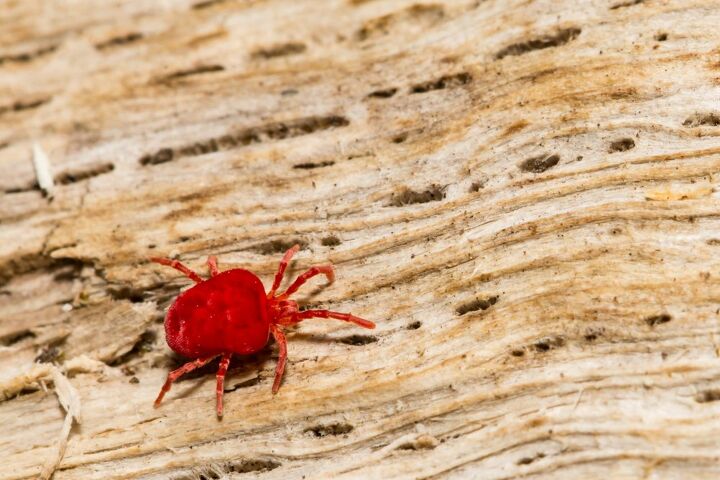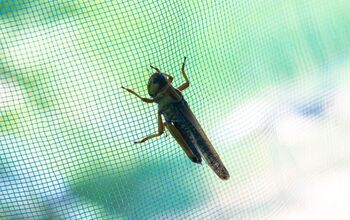Can Chiggers Live In Your Couch? (Find Out Now!)

Also known as Berry Bugs, chiggers are tiny pests that resemble something between a wood tick and a bed bug. These bugs don’t pose a threat to humans but can deliver a nasty rash that can disrupt your sleep. If you have chiggers in your home, there are simple things you can do to get rid of them.
Just like bed bugs, chiggers can temporarily live in your couch, chairs, beds, and other larger pieces of furniture. They bite humans and can even burrow under our skin and lay eggs. Because they’re practically microscopic, it can be hard to get rid of them.
Enough of making your skin crawl; let’s talk solutions. If you find chiggers on your couch or have found a strange rash on your leg, there’s nothing to worry about. Below we’ll talk about how you can get rid of them and more.
Do You Need Pest Control Services?
Get free, zero-commitment quotes from pro contractors near you.

What Do Chiggers Look Like?
Believe it or not, chiggers are actually arachnids, like spiders. They come in an array of warm-toned colors like orange and red. They can be incredibly difficult to see with the naked eye, and often people spot the rash they leave before the actual pest.
Some people can see them crawling on their legs when they’re lying in the grass. They’re most often spotted on blades of grass or low-hanging leaves. Adult chiggers don’t actually bite people; it’s the larvae that do.
The easiest way to tell the difference between an adult chigger and larvae is by the number of legs. Adults have eight legs, while larvae have just six.
Where Do Chiggers Live?
Though chiggers can be found in places like your couch or bed, they won’t stay for long. They live and breed outdoors. If you find them in your home, it’s because they were brought in from someone from outside.
When there’s a chigger problem in your yard, it doesn’t take too much time to notice. They quickly crawl onto pets and humans. They can even crawl under your scalp to lay eggs, similar to lice.
What Chiggers Can Do To People
Speaking of what they can do to use, it’s really not as scary as it sounds. Essentially, you’ll likely find small red bumps below your waist. For some reason, chiggers tend to bite legs and feet, generally not going above someone’s hips.
Sometimes you can find bites on the neckline of your shirt. People have reported chiggers biting near pant cuffs and at the top of where socks meet your calves. If there are chiggers on a beach towel or blanket, it should be washed immediately to prevent them from living in your home.
Itchy bumps from these arachnids can be more annoying than painful. If you find them on you or someone you love, take hot soapy water and wash your skin. Chiggers don’t like heat, and this can help temporarily stop the itching.
Wash the clothing you wore the day you found them as well. You can use a simple hydrocortisone cream or allergy medication to bring the itching down. If the bumps become infected, your primary care doctor can prescribe an antibiotic or steroid injection.
How to Avoid Bringing Chiggers in Your Home
The first thing you need to do is check to see if you have a chigger infestation in your yard. It’s not hard to tell if you have consistent red bumps that keep appearing on your skin after spending time outside. If you’re having trouble distinguishing if chiggers are the issue, there’s a quick test that will confirm it.
Cover as much skin as you can by wearing loose-fitting pants and a shirt. Put on a pair of thick socks and tuck the bottom of your pants into the socks. Then, make sure you’re wearing tall boots and that all collars and cuffs are buttoned.
Spray yourself down with an insect repellent and throw some sulfur powder in your shoes. Spend time outdoors where you suspect the chiggers are coming from. Again, they like to spend time in grass and low-hanging leaves.
Before heading back inside, check your clothing for chiggers. This will help keep them out of your house and spreading. I’d suggest going as far as undressing outdoors and putting your clothes in a plastic bag.
Helping Pets That Have Chigger Bites
If Fido is playing outside and you see him constantly itching himself, chiggers could be to blame. The first thing you can do to help your furry friend is to give them a warm bath. While chiggers dislike hot water, warm water will do the job without hurting your pet.
You could use a pet shampoo that has flea and tick repellent to prevent further bites. Head to the vent to get a treatment for the itching if it’s bad enough. Never use medications for humans on animals.
How to Get Rid of Chiggers
Whether you have chiggers in your yard or you brought them into your house from a day at the park, here’s how you can get rid of them.
In Your House
Hot water is the best way to combat these annoying pests. Get water that’s at least 120-degrees Fahrenheit and clean your home. If you have a lot of carpet or rugs in your home, get a shampooer that has a high heating setting.
The easiest way to get rid of chiggers in your home is to prevent them from coming in in the first place. Vacuuming regularly will also prevent them from coming back if you have them already.
In the Yard
So how can you avoid bringing them inside if they’re taking over your yard? The goal will be to eliminate their habitat, and there are plenty of ways to do so. This does involve a bit of manual labor, so don’t be shy to ask a few friends to help.
Chiggers can be found in moist, thick vegetation that isn’t in direct sunlight. If your grass is really overgrown, you’ll likely find them there. They also like to stay in densely planted trees and lay their eggs in one area.
Plenty of different pesticides work to get rid of chiggers. These need to be safely applied to your lawn, and it’s best to do this when all pets and small children are indoors. Follow the directions on the label closely and only spray where you know chiggers are living.
It’s not uncommon to need to apply the pesticide multiple times. Allow it to dry completely before using your yard again as you normally wood. If pets eat plants that have been treated, please go to the vet immediately.
Maintaining Your Yard
To prevent chiggers in your yard in the first place, keep your landscape clean and well-maintained. Below are a few tips that you can apply to keep these annoying buggers at bay.
- Mow your lawn regularly and keep it short.
- Don’t let the grass on the edges of landscaping become overgrown.
- Keep landscape beds weeded.
- Remove excessive leaf litter.
- Trim and prune landscape plants regularly.
- Don’t leave piles of brush in your yard.
- Eliminate shaded areas if necessary.
Do You Need Pest Control Services?
Get free, zero-commitment quotes from pro contractors near you.

Related Questions
Does Lysol kill chiggers?
Because Lysol is considered an insecticide for smaller pests, it works great at killing chiggers. Lysol wipes can be found at just about any store and can safely be wiped onto chigger bites. Consider an alternative like rubbing alcohol if you have sensitive skin.
Can chiggers get in your hair?
One of the most common places you’ll find chiggers on your body is in your hair. If you’ve already found them in your hair, they’ve already laid their eggs in your scalp. Because they burrow beneath the skin to lay eggs, this will quickly cause an infection. For those with thicker, longer, or textured hair, it can be more difficult to spot these pests. Have someone check your scalp for you, especially the back of your head, where it’s harder to see.
Do chiggers bite at night?
Chiggers can bite at any time of the day or night. One thing to note is that the itchiness that comes from their bites can keep you up at night or even disrupt your sleep. If this happens, dispose of your bedding and look for next in your mattress, box spring, or bed frame.
Related Guides

Kirstin is a passionate writer who loves helping people learn new things when it comes to home improvement. When she's not behind a keyboard, she enjoys DIY projects, crafts, spending time with her pets, and making videos. She hopes that with all she writes, someone is finding a solution to their home improvement needs.
More by Kirstin Harrington




















![How To Reset A Whirlpool Cabrio Washer [In 5 Easy Steps!]](https://cdn-fastly.upgradedhome.com/media/2023/07/31/9076531/how-to-reset-a-whirlpool-cabrio-washer-in-5-easy-steps.jpg?size=350x220)






